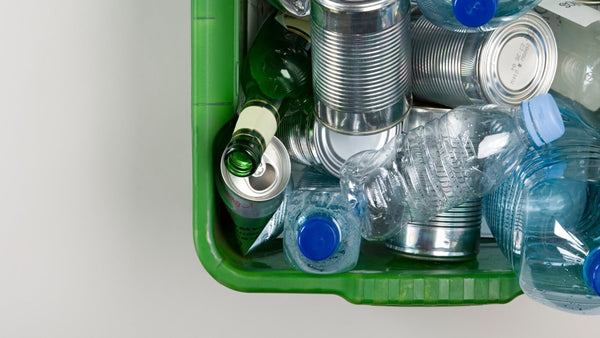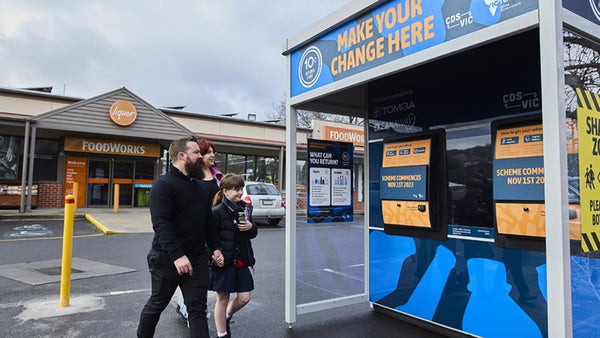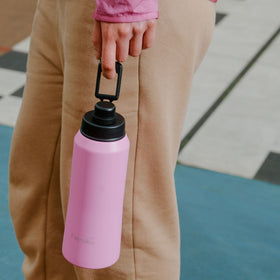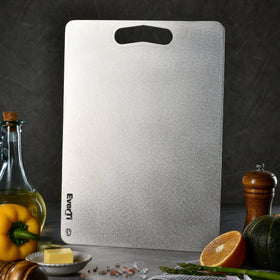
Green Evolution: How Victoria's Container Deposit Scheme Will Impact the Environment
Victoria said goodbye to overflowing landfills and hello to a cleaner future with the launch of its Container Deposit Scheme (CDS) on November 1, 2023. Inspired by the success stories of South Australia and the Northern Territory, Victoria's CDS tackles waste head on, promoting recycling and ushering in a new era of sustainability for the state.
This article explores Victoria's CDS and how it benefits the environment by reducing litter, conserving resources, incentivising recycling drink containers, and creating a circular economy. We'll also uncover inspiring international examples that showcase the power of container deposit schemes. Discover how Victoria's CDS sets the stage for a greener tomorrow!
The Benefits of Recycling Drink Containers under Victoria's Container Deposit Scheme
Cash For Containers
The arrival of Victoria's Container Deposit Scheme marks a major milestone in our collective journey towards a cleaner, greener future. This scheme allows consumers to empty, return, and recycle drink containers like cans, bottles, and cartons to specific recycling points, and receive a 10-cent refund on every eligible container. This initiative promotes responsible recycling habits and encourages locals to divert these items from landfills, promoting a circular economy.
Promoting Economic Growth
The implementation of this scheme has a ripple effect that extends beyond environmental benefits. It creates new jobs in the sorting, collection, and recycling sectors, which in turn boosts Victoria's economy.
Community Involvement
Beyond individual participation, community groups, schools, and charities can also benefit from this program. These organisations can collect eligible containers and redeem them for the 10-cent refund, generating funds for their activities. This fosters community involvement in environmental initiatives while supporting sustainability efforts.

More and Better Recycling
At the heart of Victoria’s new Container Deposit Scheme is a commitment to more and better recycling. The CDS targets commonly littered drink containers, like plastic soft drink bottles and glass beer bottles, and incentivises their recycling.
What happens to these containers next? They are transformed into new products, turning the linear ‘take-make-dispose’ approach on its head and aligning with the ambition for a circular economy.
Not only does this keep returned containers out of landfills, but it also keeps them off the streets, contributing to environmental preservation and tidiness. It’s a win-win scenario – we’re recycling more and littering less!
Reducing Waste and Litter
There’s no denying it—litter is an eyesore. But it’s not just about aesthetics. Discarded beverage containers can harm wildlife and pollute our waterways. The CDS is set to be a game changer in this regard. It is projected to reduce waste in the state by up to half; hundreds of job opportunities will be created while contributing to significantly cleaner natural and urban environments.
This scheme targets beverage containers commonly found trashed in our environment, which include:
- plastic soft drink bottles
- glass beer bottles
- canned soft drinks
- small fruit/vegetable juice cartons
By placing a value on these containers, the CDS encourages us to view them not as waste but as resources to be reclaimed and recycled.
How the CDS Works: Key Players and Processes

Image credit: TOMRA Cleanaway
The intricate workings of Victoria's CDS involve several key players, each playing a vital role in its success. VicReturn, the appointed scheme coordinator, is at the helm, managing the overarching operations of the CDS. They're not alone in this endeavour, having formed partnerships with not for profit organisations to operate collection points as part of the CDS.
These partnerships are more than logistical collaborations; they are responsible for creating new job and economic opportunities within the CDS's scope.
Scheme Coordinator and Zone Operators
VicReturn manages the financial and administrative aspects of the deposit scheme (CDS Vic) under the watchful eye of Recycling Victoria. They are also tasked with a myriad of responsibilities, including:
- preventing fraud through audits
- paying refund amounts and collection network costs to zone operators
- reporting against performance targets established by the government
Who are these zone operators?
Zone operators are dedicated entities such as Return-it, TOMRA Cleanaway, and Visy. They are tasked with establishing and maintaining a network of refund points in their appointed zones, but their duties don't end there.
Zone operators are responsible for the proper functioning of the Container Deposit Scheme (CDS). One of their key tasks is ensuring that refund amounts are distributed to consumers promptly and accurately. They also need to ensure that payments are made to refund point operators, who play an essential role in facilitating the return of containers. Finally, they must report on CDS participation and redemption rates regularly, which helps monitor the scheme's effectiveness and identify areas for improvement.
Container Collection Points and Refund Process
A critical component of the CDS is its network of over 600 refund points, including reverse vending machines and depots, spread across Victoria. The magic happens at these collection points, transforming discarded containers into new products while earning cash or receiving other refund forms.
Participants receive a 10-cent refund per eligible container returned, with the added option to donate refunds to participating organisations like charities or environmental groups, maximising the scheme's positive impact.
What's an eligible drink container and what are the exclusions?

Image credit: CDS Vic
Now that we’ve covered how the CDS works, let’s dive into the specifics of what containers are eligible for the scheme. These include most beverage containers between 150 ml to 3 litres made from:
- glass
- plastic
- aluminum
- steel
- liquid paperboard (carton)
All containers should also be marked with a ‘10c’ refund symbol, should not be crushed, must be empty, and have labels on for processing.
But not all containers are eligible for the scheme. Containers not eligible are generally those smaller than 150ml and greater than 3 liters. The ones specifically excluded are:
- Plain milk containers other than flavoured milk over 1L
- Glass wine and spirit bottles
- Large beverage pouches with wine over 250mL
- Health tonics under 150mL
- Cordial bottles
- Large juice or vegetable containers over 1L
Community Involvement and Fundraising Opportunities
One of the CDS's most exciting aspects is the opportunity it presents for community involvement and fundraising. By collecting eligible drink containers for the 10-cent refund, schools can raise funds for school projects. They can also integrate the CDS into their learning programs, educating students on recycling and sustainability while raising funds.
But it's not just schools that stand to benefit. Community groups, sporting clubs, and charities can garner financial support for their causes by collecting empty containers for refunds. They can operate a refund point or receive donated eligible containers to raise funds through the CDS.
Even businesses can get involved, setting up dedicated donation return points for the community to easily support charities and community groups. Through the CDS, recycling becomes an act of environmental stewardship and a means of supporting the community.
The Circular Economy and Victoria's Waste Management Goals

Victoria's container deposit scheme (CDS) is not an isolated initiative. It's a vital part of the state's broader strategy for waste management and the transition to a circular economy. The CDS Vic aligns with Victoria's 10 year circular economy plan, "Recycling Victoria: A new economy." This encompasses systemic changes to enhance the recycling industry, including implementing a container deposit scheme.
By helping to achieve Victoria's objectives of having a cleaner and greener state, the CDS showcases its pivotal role in the state's broader strategy. This systemic change aims to achieve multiple objectives, such as:
- elevating the quality and quantity of recycling and reusing of our precious resources
- reducing waste, landfill, and litter
- reaching the state's net zero emissions by 2050
- creating new job opportunities
- laying the foundation for a sustainable and thriving circular economy
Case Studies: Success Stories from Other Regions
The transformative power of container deposit schemes is not theoretical. We have tangible proof from regions around the globe. Denmark, for instance, boasts a successful deposit return scheme with a 96% return rate for plastic bottles in 2021. South Australia achieved a 76% return rate for beverage containers in 2022–2023, demonstrating the program’s effectiveness in container recovery.
Norway’s scheme has been remarkably successful with a return rate of over 92.3% for beverage containers in 2021. Germany’s bottle deposit scheme achieves a return rate of 98% for containers, serving as a robust model for efficient recycling.
These success stories serve as beacons of hope, highlighting the transformative potential of container deposit schemes as a recycling system. They prove that it is possible to dramatically increase recycling rates, reduce litter, and foster a circular economy.
Turning Waste into Wealth with Victoria's CDS
Victoria's Container Deposit Scheme is a powerful tool that empowers us to create a greener future. Through this scheme, we can transform waste into wealth, reduce litter, create opportunities, and preserve the environment. Let's embrace this green evolution and remember that every container we recycle counts towards a more sustainable environment.










